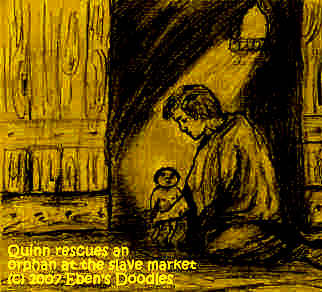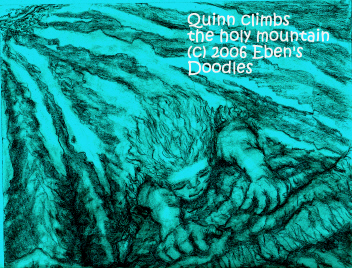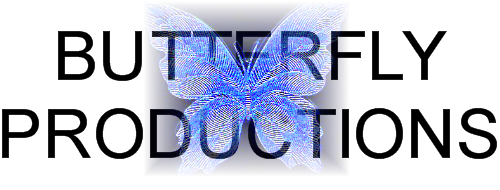
I I I ,
P A R T
I I I ,
L U X
E X
T E N E B R I S
A N N O
S T E L L A E

"Hey, this isn't Alantah! And certainly not Baton Roo! Where am I? Take me home immediately, or--"
Homer ignored her as he took a few steps and climbed a big rock, trying to see what was over the ridge. But then the White Angel came walking round the far end of the badly crumpled airship. Homer gazed in astonishment as he watched his guardian stick a sword into it, breaking through into each gas cell so that the helium was released in a deafening roar.
Within minutes the airship was settling down, all its former vast, towering bulk turned to a wretched tangle that resembled a collapsed tent thrown over snags and tree limbs.
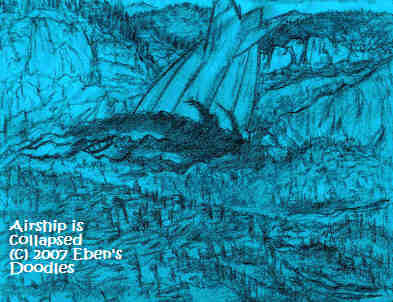
Talulah gazed at the White Angel, for once struck speechless.
"There he is again!" she finally sputtered. "Stop him! The big creep! He's ruining our only way out of this damn place!"
Homer turned to her, and slowly shook his head. "But we can't leave. The cities--all gone! Burned up! You saw that when we flew over them. They're uninhabitable now. Who knows? Maybe we're the only people left! We can't go back there. So wait! We just have to wait and see."
Wait and see what? He really had no idea. But he was hoping his volunteer guardian had something in mind.
The White Angel obviously did have something in mind, but he wasn't explaining it. Motioning to them, he started walking away. Homer grabbed Talulah's arm. "He wants us to follow!
Cussing everything she could think of, the beauty queen let herself be pulled away from the airship. "Wait, I left my makeup kit!" She yanked her arm away from Homer's hand.
He grabbed her arm again.
"No time for that--cmon!"
Overpowering her, though she gave him a couple kicks in his leg, he got her headed in the path the White Angel had taken.
They realized they were in mountains--as there were ridges, cliffs, and ravines all around them.
Then the White Angel stopped, when they were gasping for breath from hurrying as fast as they could in the rough terrain on a trail that had not been used for years.
He was pushing at the mountainside, and then they saw the reason--the big rock he had grabbed was moving away from turned out to be the entrance to a cave--a cavern, in fact.
They caught up to him, and stopped at the opening, wondering what next to do as the White Angel finished clearing a wide enough entrance for them to enter.
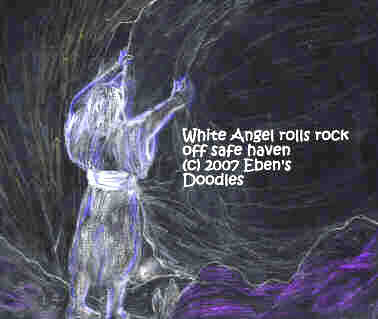
They hadn't gone more than a few steps before their guide turned Indian!
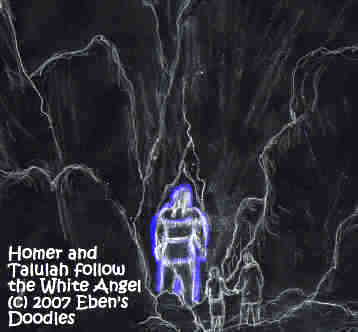
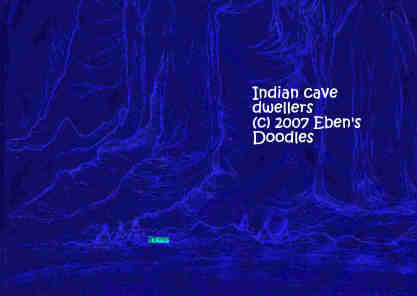
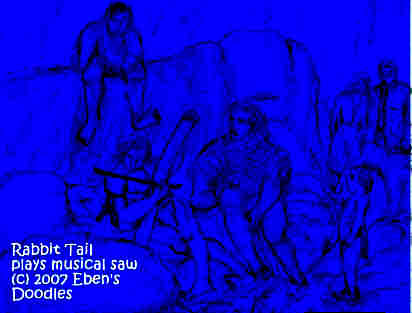
Homer and Talulah continued toward the tipis, and the music restarted as soon as they were out of sight.
"They're so secretive, aren't they?" Talulah commented. "What are we going to do now? Stay with these savages? You gotta be crazy! I'm not staying here. Take me home!"
Homer was getting annoyed. "What home? I don't even have a home now--so we have to make the best of it. We don't have a choice!"
"Are you kidding, I am not staying here in this filthy hole in the ground!" she retorted, with a shrill edge to her voice that made Homer grit his teeth.
He saw the kick coming, but was not prepared, and she caught him in the groin.
He staggered a few feet away and leaned against a rock.
"You're not going to make me do anything!" she snarled.
"She's crazy!" he plumb thought as the pain surged through him. "Beaten to an inch of her life, and still kicking!"
When he had recovered, he didn't want to even look at her. So he continued doggedly walking, and when he glanced around, he was surprised to see Talulah was actually not going the opposite direction but was following.
When they reached the tipis, they saw more Indians, this time women and children.
An old man was sitting on a big rock, a blanket around him and covering the rock.
Homer went up to him and signed to him.
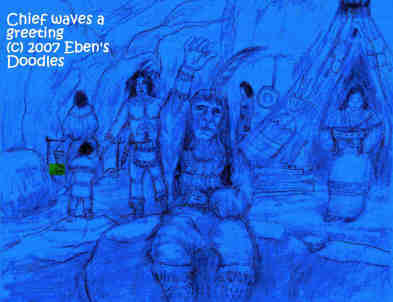
"May we stay with you for a while? We were brought here--for shelter. And I don't know where else we can go at the moment."
How could he describe what had happened to the world? He had not been able to grasp it yet--it was all so sudden and incomprehensible. Yet the sense of it was everywhere, needing no explanation--and crushing.
"We have come a long way to get to this place. We are very tired."
The chief looked at them and nodded, with a second, pitying glance at Talulah's numerous bruises, though how he could see them in the dim light, Homer had no idea. Without saying anything, women came toward them, carrying some items--a bedroll for Homer, as it turned out, and a shawl for Talulah. Feeling the cool damp by now of the cavern, Talulah snatched the shawl after looking closely at it first, and wrapped it around herself.
Homer thanked the chief for the bedroll and for letting them stay, but he looked around and wondered where they would sleep. No one seemed to want to direct him to a spot, so he decided to go and lay it out on the edge of he camp, beneath an overhang of big rocks. Talulah went to follow him, but a woman took her hand and smiled. Annoyed, Talulah yanked her hand away and went to follow Homer. The woman persisted, taking hold of Talulah's arm, and smiling.
Talulah was now steaming.
"What does she want?" she cried to Homer.
"I think she wants you to go with her."
Talulah swore. "What? I'm not sleeping with any dirty savages--they might rob and kill me in my sleep, and take my scalp!
Homer laughed. "I don't think they will do you any harm. They all seem pretty friendly to us--so why not see what they want to show you?"
Talulah still wasn't convinced, and was determined to stay with Homer, but the woman wouldn't leave them.
Finally, Talulah clenched her fists, and for a moment Homer thought she might light into the woman, but after the beauty queen shook her fists and said a few choice words at the woman's expense, she suddenly gave in. Looking utterly exhausted, she let herself be led away to the women's tipis, and Homer was left in alone and in peace.
Relieved of Talulah's company, he felt relieved, and spread his bedroll and planned to sink onto it, but he remembered his furry companion. It was amazing, now that he thought about it, how long Rainey had been quiet, not moving at all, the whole time since they had left the airship.
For an ugly moment Homer wondered if the ferret was dead--it lay so quiet, but as he took it from his pocket the ferret seemed strangly reluctant to move, as if it were frozen with fear.
How unlike the ferret! What did it sense had happened to the world? Homer wondered.
He put the ferret on his knee, and stroked it gently with his finger, and gradually the ferret revived and showed signs of life. Finally, it arched its back, and its eyes gleamed, as if with renewed life.
"That's better, old fella!" Homer said, relieved that Rainey was going to make the adjustment after all to their safe haven, even if it was nothing like anything they had known.
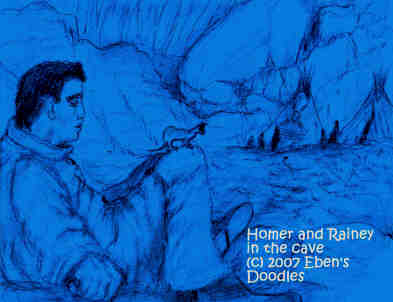
The thought nagged him, and he had no way of knowing for sure.
"What did you do back there, old fella?" Homer asked as the ferret turned round to look at him. "Did you start this war? Huh? Was it you, Rainey? Bad, bad ferret! But I forgive you--you wouldn't do it on purpose, would you?"
Of course, an animal had no conception about nuclear rocketry and control panels and such! If the ferret had something to do with it--it was too late now--the deed was done!
He let Rainey crawl down his leg to the ground and start investigating the rocks for something to eat. Who knows, maybe the ferret could find something, sparing him the trouble of going for some meat from the Indian camp.
Homer looked about. "What a strange place!" he thought. How it could glow like it did, he had no idea. He could not see all of it--for the cavern was too big--but he knew he shouldn't be able to see any of it. Perhaps there were hole in the roof, but he couldn't tell, surrounded by the huge rocks as he was.
By this time, he couldn't keep his eyelids open. He sank back on his bedroll, and that was the last thing he knew for a long time. When he awoke, he did not know where he was for a few moments. Struggling to make sense of what he saw, he wondered if he was awake. But then he remembered the whole journey to the cave, and everything prior to it came rushing back, in full detail too. He had been in a merdifully dazed state, walking like a sonambulist, he realized--for the shock of the previous day had numbed him to the full catastrophe.
Now he realized what he had only half felt the day before. His God had utterly faild to save the world, which was supposedly full of his people--what did that mean? Had the God of Isma abandoned the world to destruction? Evidently! How could he deny they were all being punished with completely destruction?
He felt panic--and fright--and had no idea where to go to escape, as if the cavern was suffocating him.
He sprang up, and looked wildly around. He wondered what would happen if he could find the way out. Would he be able to get to Makon on foot? Was there anybody on the roads--any cars and trucks? Or would everything be radioactive? All he knew, now that Talulah was relatively safe, was that he had to find Faye, his grandmotehr,a nd Higgins.
He began his search for an exit, even though something told him to slow down and reconsider. As he rushed by the group of Indian men, he saw they had towels in hand and were beckoning to him to follow them.
In his frantic state of mind, this almost made him stop and think, but he shook his head and continued on. After a search among the boulders and toweering sides of the cavern, without any sign of the entrance, he turned around. Wasn't he a fool to think there was a way out? Homer thought. "The White Angel had sealed the cave, hadn't he?"
Feeling trapped, Homer didn't know what to do, but he heard a whistle. He heard the whistle again. He looked it its direction, and thought he saw an arm beckoning him.
Giving up his search for an escape hatch out of the cave, Homer went to join the whistler, and found an Indian about his age leading the group of younger men and a few boys to a group of pools.
Before long he stopped at one of the shallow pools, and they soon were bathing. Watching them, Homer decided he had no reason but to join them, and soon he was stepping down into the water, which shone blue like the walls of the cavern.
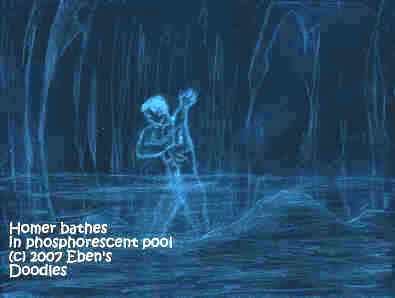
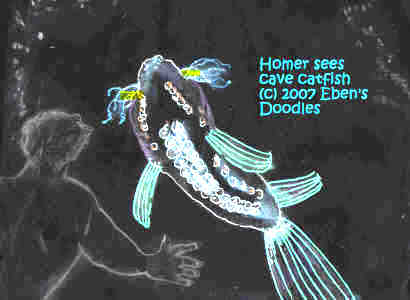
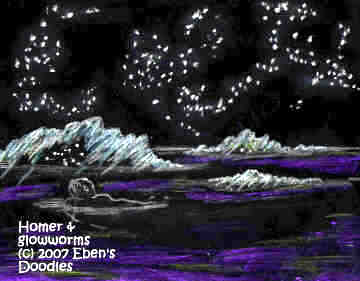
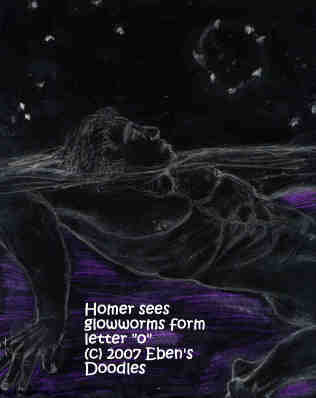
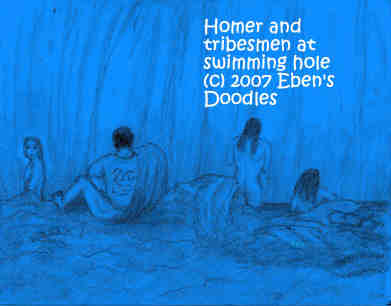
He had many questions, but the ones that were most troubling were about his home in Makon. What had happened to it? Where were his grandmother, Higgins, and Faye? How could he ever get to them, with Talulah on his hands always pulling in the opposite direction? He just couldn't abandon her--he wasn't made that way. He had to see that she got home safely--if there was a home for her--for that was the least duty of a Confederate man toward the opposite sex. After he saw to that, she was on her own.
Now that he had settled the whole problem of his father's disappearance, he didn't have any reason not to return home--even if it would never be a real home--since the family he had wasn't really his.
When he returned to the tipis with the others, he found a number of women gathered at the entrance of one, and they all stared at him as he approached.
Before he could ask about Talulah's whereabouts, Faye stepped out.
Astonished, Homer stepped backwards. He couldn't believe his eyes at first. But it was Faye, only her hair had grown to her shoulders, and she was wearing her native clothes.
He wanted to ask her immediately if she knew anything about his grandmother and Higgins, and how she had found the cave where he was marooned, but she gave him no opportunity.
"Your friend is deathly ill--she isn't going to make it, I'm afraid. Can you come in with me?"
Homer followed her in and sat down, as Faye attended to Talulah, who was lying on a bed, moaning and saying unintelligible words, her arms reaching up continuously as if she were trying to get hold of something to help pull her from the bed.
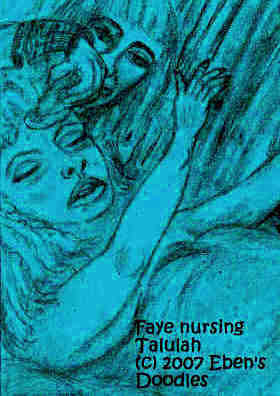
Just then Rainey leaped into the tipi, and went and snuggled up on Talulah's side.
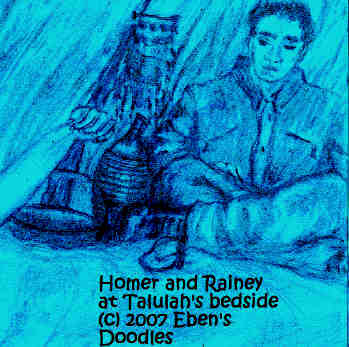
Faye finished getting Talulah to drink a little water, then turned to Homer. "Could you leave us now? I've got to turn her over, and she has only a blanket over her, as she is burning hot, and can't take anything more next to her skin--particularly where the sores have broken out. I think it's a rash from a radioactive burn. It's gone all the way in, and reached her internal organs!"
Homer stepped outside, and waited. He heard Faye calling the women, and two of them went inside to be with Faye and Talulah. Once or twice they came and got fresh water and went back in. One came out with a blanket and put it on the smouldering fire and covered it, so that the smoke and ash did not spread.
Homer heard some loud moaning, and knew it was Talulah. Then there was silence. He waited, and finally Faye stepped out, and the other women left them alone.
Faye turned to Homer, and her eyes told him already that Talulah was gone.
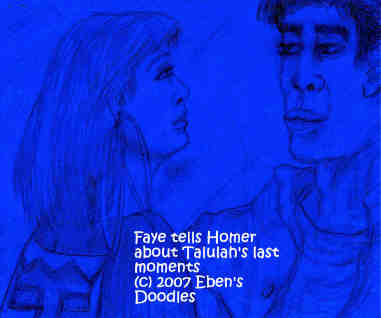
"Miss Coldbank didn't die easily, Homer. Not at first anyway. She had always fought for everything she had, and now it was no different. She thought she could beat this too--but there was no way she could kick and claw her way out this time--she had got too much exposure to the death rays from the atomic blasts."
She paused, eyeing Homer more clinically. "But you were with her--and yet--you don't seem to be affected! You must have some kind of invisible, heavenly shield protecting you! Otherwise, you'd be as sick as she was!"
She went and sat down on a big rock, and Homer followed and sat down facing her. She continued. "I was able to speak to her, though, when she became more lucid just before she died. Her eyes shot open, and were clear, and she said she had been conscious of her surroundings and the people around her, only she hadn't had the strength to open her eyes. Now she wanted to know something, she said. She said she knew she was dying, for her feet were ice cold, and the cold was traveling up her legs and would soon reach her heart.
"Strangely, she wasn't terrified like most people are of death, but asked me, with her eyes wide open, 'Nurse, tell me what you know. Is there really anything after death, or is it just an iman's old cock and bull story?'
"I could tell there wasn't time to convince her about the hereafter, for being who she is she would probably think it am impertinence of mine to teach her theology, and instead told her what she really needed to know.
"Somebody's knocking on your heart's door you really need to know, Miss Coldbank."
That surprised her. 'Oh, who?' she said. "I thought I knew everybody worth knowing in this world!"
"I took her hand in mine and told it to her it straight--what she must have sensed was the truth for her expression didn't waver as she listened. 'He's the Person you've been searching for in men, money, and fame, but never could find. His Name is Yeshua.'
"She repeated the Name, then said, "Don't know him--is he an agent, or somebody rich and famous I should meet?'
"No, Miss Coldbank. This is the Name for God, the Person you need to know, for He is the One knocking on your door, and don't you want to meet him? He loves you, and has always had good things for you, but you were always running after other things."
"Miss Coldbank didn't say anything for a while. Her eyes closed. I thought she had gone, as I felt her pulse and tried to see if she were breathing, but then her eyes opened, and her voice, though a whisper, was enough for me to hear what she had been thinking while she was drifting away.
'I had to come back to tell you this. Tell Homer thanks for bringing me here. Tell him I just met this God, this Yeshua you named. He appeared to me, and He is what you said He is. He really does have good things--things I never imagined possible. I can live forever too. So I'm going with him! Tell Homer, all it takes is asking him to forgive you and to give up your self to Him--let Him lead you--'"
Faye stopped abruptly. Homer stared at Faye, but she wasn't adding anything to her account. He stood up, and sighed, then walked away. He had to find some place to be by himself, so he could think this all through. As for Rainey, he was still inside the tipi with Talulah--and could be left there to sleep.
Homer was making his way through some towering columns of rock when he saw, far overhead, a beam of light. It was different from the bluish phosphorescence of the pools and the glow off the cave lichens and the swarms of glowworms. This was real daylight!
He felt he had to get to it, even if it was dangerous to expose himself to the outer atmosphere.
It was a diffcult climb. He was tempted to give up a number of times. The rock was so broken, the way up so steep, he was afraid to look down, because he knew all he would see was a vast, black hole waiting for one misstep his to leap up and swallow him.
Finally, he reached a series of big step-like rocks that seemed carved out for a giant's foot, and at the end of these he reached a step where the light now poured out, covering him head to foot.
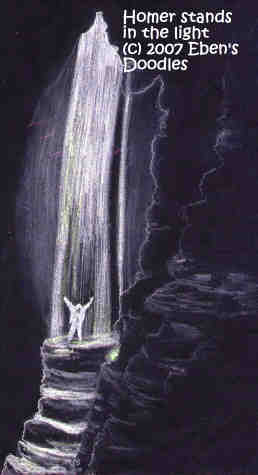
All his dark wrestlings of soul concerning his religion now seemed a thing of the past. He could now see, seemingly, what it all meant. His long wandering search had come to this very place, he sensed. What did he now know? The terrible helplessness he had felt, confronted with Talulah's dying, was due to the lack in his Ismanic religion, not anything else. At last he had come close to a way out of his dark cave--if only he could climb the rest of the way and the opening was large enough to squeeze through!
He rested, however, intending to make the final ascent as soon as he could. It gave him time to consider a few things. Talulah had gone, but she had left him words to think about. They agreed with what Faye had told him before, he realized, but he hadn't accepted them then. Only now did they seem to be meant for him too--not just her Indian people, whom he had all his life looked down upon as an inferior people following a false god.
Suddenly, he heard a great voice--though it was not audible, it shook him to the core, as the words formed in his mind. It was unlike no other voice he had ever heard--but it seemed so personal, as if the speaker knew him from earliest childhood.
He did not have long to wait for an answer. The voice began speaking to him, and Homer seized on every word as if it were life itself.
Faye examined Homer as he spoke, and she could tell he was different, and she believed him. She spoke with the chief, and he accepted her words. The people too acccepted her words together with Homer's testimony. It was time to go! Immediately, they began to gather their things and the tipis were taken down.
Rains were coming, to wash away the worst of the radioactivity from the path where the White Angel would lead them, a new home that lay somewhere across the Straits that divided Publicatexa and the CSA.
Sand storms would follow, to lay down a thick carpet over the cleansed earth, Yeshua had instructed Homer. But they could not wander off the path set for them--to do so was death. Also, they must not eat anything they saw growing along the way. All things were contaminated on the eastern side of the Straits.
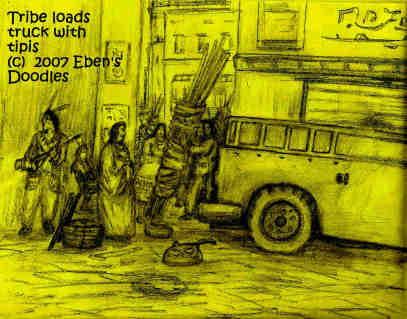
How would they be able to cross? Yet their transport had been provided--for shrimp fisherman had abandoned their boats, and they found what they needed, with gas still in the tanks. Would the owners ever return? It was not likely, for they even left keys in the ignitions. Taking what they thought they needed from the rest of the fleet, they all got into two boats, and then proceeded.
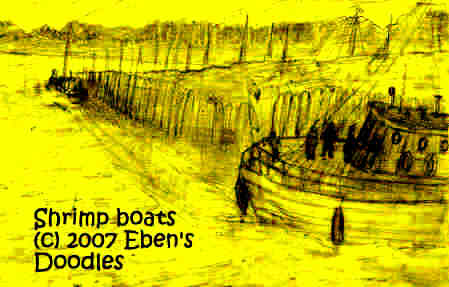
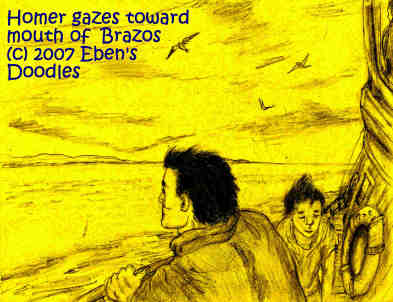
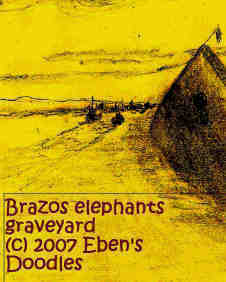
They pitched camp, ate and rested. Logs were set afire to burn and continue burning all night, to keep off any wild critters and also warm the cold night desert air.
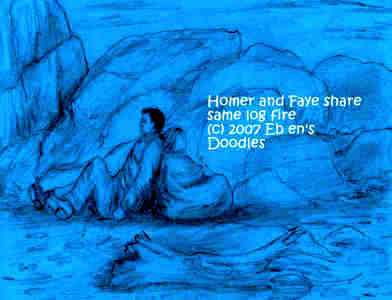
All the time they rested, the prevailing winds veered eastward, not westward, so they were spared, and this continued until they passed over the low hills and reached the plains further upriver, at a river ford where they would be free of the wind-borne radioactive dust.
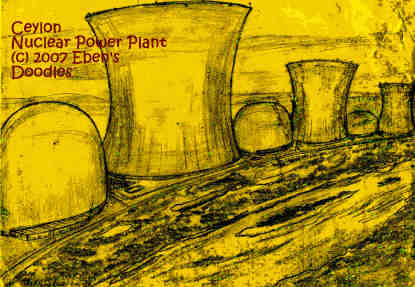
No one came back to reclaim the facility and the environs--it was the tribe's for as long as they wanted it. Not for 717 years would the nuclear storage tanks and cells that held the fuel rods leak and present any problem for the inhabitants in the area.
Here they stopped and decided to settle, since there was water and the land was clean. Further on they could not be sure they would find anything better--as there were cities to the north, which surely had been destroyed.
As the people settled in to their new home, and Faye and Homer married, and then filled a tipi of their own with four boys and two girls, a favorite song of the tribe was often sung by him and his family.
A repentent slave ship captain had composed it long, long before, after he turned to God and quit his terrible life, after almost losing his life aboard ship in a storm.
"I was blind, but now I see," one of the verses went, and Homer, until his eyes closed as an old man, thought that particular line, unknown to the slaveship captain, was written especially about him. He had good reason to think this, as he recalled what a dark, twisting path he had struggled down, trying to find not just his father but himself, only to find himself by losing himself.
But there was yet more in the golden promises of Yeshua long ago given him in the shaft of light than Homer would live to see. A son, a descendant with Faye's light-colored hair, was promised him, who would be born at Ceylon and when still a youth he would climb one of the ruined domes of the plant, to see the wide world that stretched beyond his little village.
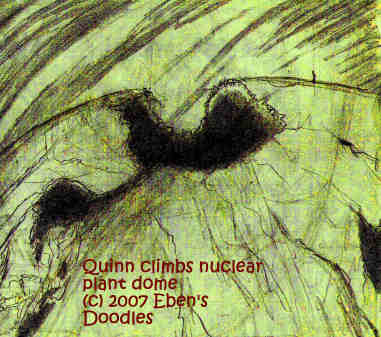
His father could not accept this easily, but he let his son go, and he did fulfill his heart's desire. He became a great healer. He would set even infant slaves free--children no slave master wanted and who would surely die, starved to death in the slave quarters before their mothers were sold.
